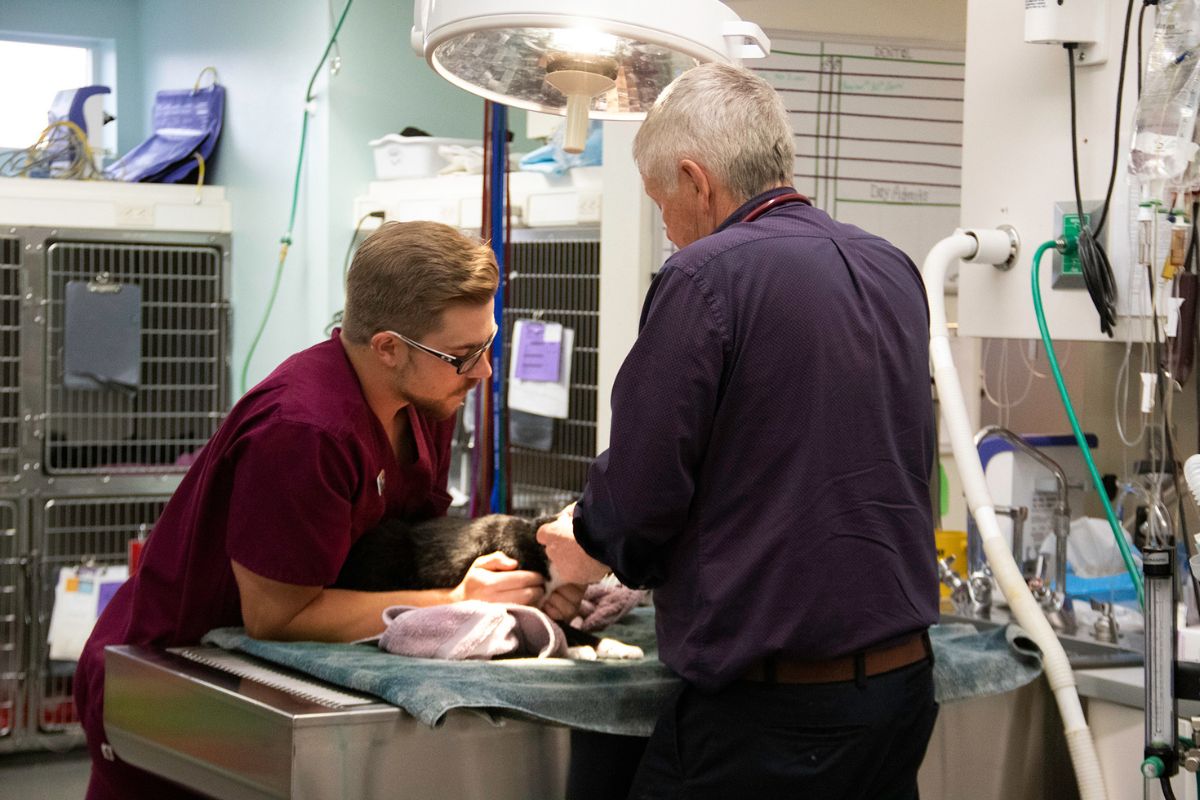Veterinary Services
Pet Examination
Keep your furry family members healthy with comprehensive pet examinations in Elko, NV, at Elko Veterinary Clinic. From nose to tail, we prioritize your pet’s well-being.
Comprehensive Pet Wellness Exam in Elko, NV
Our pets are a part of our family, and every responsible owner wants to ensure that their pets are in the very best of health. The majority of conditions that animals are susceptible to have no obvious symptoms early on. Once they do present themselves, many pets may already be suffering and may then require extensive medical assistance. Your pet may not be able to tell you what is wrong, but our examinations aim to discover the source of any problems or, indeed, prevent them before they arise.
To help keep your pet in optimum health, we recommend full nose-to-tail wellness examinations at least once per year. If you have recently purchased a pet, then we strongly recommend that you book an appointment for their first examination within the first few weeks of ownership. Younger animals are more vulnerable to illness, and this will allow us to reassure you of their health and give us a starting point for their medical records.
What a Physical Exam Includes
Your pet’s physical examination will include some or all of the following:
Abdomen and anal sac examination to check for swellings, bloating, or any other abnormalities.
Bellybutton check in puppies or kittens to ensure there is no hernia.
Examining the condition of the coat and skin can indicate the overall health of the animal.
Checking the genital area for any malformation.
Examination of the heart and lungs, checking for any irregularities such as heart murmurs.
Examination of the ear canals and ear flaps for parasites, infection, growths, or tumors.
Weight check, where dietary or exercise recommendations may also be made.
Eye exam. Your veterinarian will check for discharge, redness, and abnormal responses to light. They will also examine the optic nerve in the back of the eye.
Full dental check-up, including looking for any signs of periodontal disease.
Older pets may require blood tests to check their liver, kidneys, and other internal organs.
If your pet requires any routine vaccinations or treatment, then they will usually be taken care of at this time; for example, your dog may be tested yearly for heartworms.
Fecal testing may also be required, so you may be asked to provide a stool sample from your pet. Fecal testing is vital to allow your veterinarian to check for internal parasites that live in your pet’s gastrointestinal tract. These parasites can be deadly in pets and cause health problems for humans. Examples include roundworms and hookworms.
Abdomen and anal sac examination to check for swellings, bloating, or any other abnormalities.
Bellybutton check in puppies or kittens to ensure there is no hernia.
Examining the condition of the coat and skin can indicate the overall health of the animal.
Checking the genital area for any malformation.
Examination of the heart and lungs, checking for any irregularities such as heart murmurs.
Examination of the ear canals and ear flaps for parasites, infection, growths, or tumors.
Weight check, where dietary or exercise recommendations may also be made.
Eye exam. Your veterinarian will check for discharge, redness, and abnormal responses to light. They will also examine the optic nerve in the back of the eye.
Full dental check-up, including looking for any signs of periodontal disease.
Older pets may require blood tests to check their liver, kidneys, and other internal organs.
If your pet requires any routine vaccinations or treatment, then they will usually be taken care of at this time; for example, your dog may be tested yearly for heartworms.
Fecal testing may also be required, so you may be asked to provide a stool sample from your pet. Fecal testing is vital to allow your veterinarian to check for internal parasites that live in your pet’s gastrointestinal tract. These parasites can be deadly in pets and cause health problems for humans. Examples include roundworms and hookworms.


